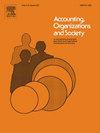是什么让评级有用?ESG评级领域认知实践的转变
IF 4
2区 管理学
Q1 BUSINESS, FINANCE
引用次数: 0
摘要
在过去的三十年里,围绕评级的生产和消费出现了一个新的领域,旨在反映企业在环境、社会和治理(ESG)方面的表现。通过研究该领域评级的产生和转换,我们为最近关于“会计文化领域”的讨论做出了贡献,其中计算创新是由超越正式规则或法规的实体开发的。我们分析了一家ESG评级机构如何试图为“整体”ESG评级设定标准,而该机构与不同领域参与者之间的互动导致了其评级实践背后逻辑的转变和混杂。基于认识论实践中关于生产和消费思维的文献,我们分析了该机构如何将其评级从可持续性绩效的“准确”代表转变为市场参与者的可用参考。这种转变引发了认知过程的加速,分析师判断的空心化,以及他们对评级可能破坏现有投资实践的信心的逐渐消失。我们讨论了我们的研究结果对更好地理解评级过程及其对ESG评级变革潜力的影响的影响,这些评级最终由投资者的偏好决定。我们的案例还暗示了通过混合认知方法在以市场为基础的会计领域传播替代逻辑的潜在起点。本文章由计算机程序翻译,如有差异,请以英文原文为准。
What makes a rating useable? Shifting epistemic practices in the ESG rating field
In the last three decades, a new field has emerged around the production and consumption of ratings seeking to reflect corporate performance concerning environmental, social, and governance (ESG) matters. By studying the production and transformation of a rating in this field, we contribute to recent discussions about “cultural fields of accounting”, where calculative innovations are developed by entities operating beyond formal rules or regulations. We analyze how an ESG rating agency tried to set a standard for a “holistic” ESG rating, while interactions between the agency and diverse field actors led to the shifting and hybridizing of logics underlying its rating practices. Building on the literature on production and consumption thinking in epistemic practice, we analyze how the agency transformed its rating from an “accurate” representation of sustainability performance to a useable reference for market actors. This shift provoked an acceleration of epistemic processes, a hollowing-out of analysts' judgment, and a progressive evaporation of their faith in the ratings' potential to disrupt existing investment practices. We discuss the implications of our findings for a better understanding of rating processes and their effects on the transformative potential of ESG ratings, which are ultimately shaped by investors’ preferences. Our case also hints at potential starting points for the diffusion of alternative logics in market-based accounting fields through a hybrid epistemic approach.
求助全文
通过发布文献求助,成功后即可免费获取论文全文。
去求助
来源期刊

Accounting Organizations and Society
BUSINESS, FINANCE-
CiteScore
7.80
自引率
6.40%
发文量
38
期刊介绍:
Accounting, Organizations & Society is a major international journal concerned with all aspects of the relationship between accounting and human behaviour, organizational structures and processes, and the changing social and political environment of the enterprise.
 求助内容:
求助内容: 应助结果提醒方式:
应助结果提醒方式:


